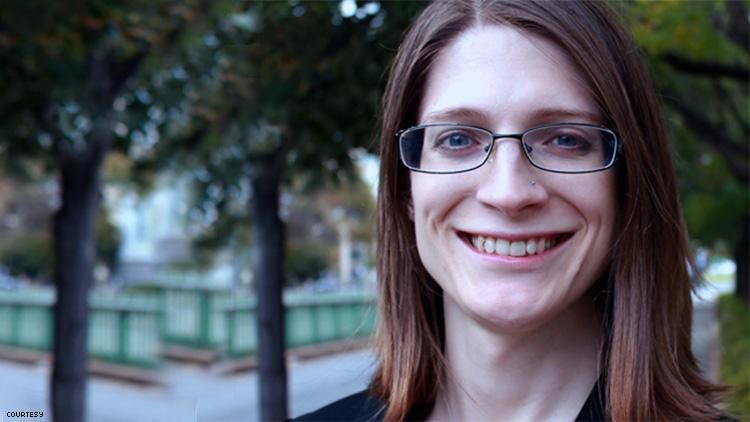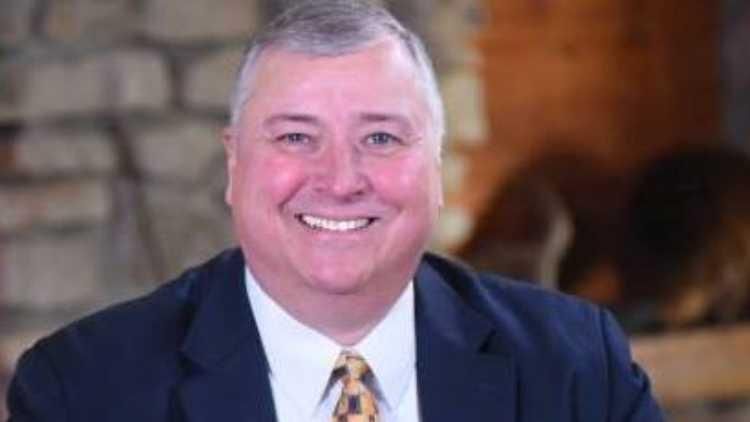12 Laws Needed by the LGBTQ Community Right Now
www.advocate.com/politics/2019/6/02/12-laws-needed-lgbtq-community-right-now
12 Laws Needed by the LGBTQ Community Right Now
www.advocate.com/politics/2019/6/02/12-laws-needed-lgbtq-community-right-now
Ride the Train or Cross the Street With Pride in Chicago

Elevated trains and crosswalks are decked out in rainbow colors for Pride Month.
www.advocate.com/news/2019/6/02/ride-train-or-cross-street-pride-chicago
Must-See LGBTQ TV: ‘Tales of the City’ premiere; new seasons of ‘grown-ish’ and ‘The Handmaid’s Tale’; and documentary ‘XY Chelsea’

Grab the remote, set your DVR or queue up your streaming service of choice! GLAAD is bringing you the highlights LGBTQ on TV this week. Check back every Sunday for up-to-date coverage in LGBTQ-inclusive programming on TV.
On Wednesday, the third season of Emmy Award-winning series The Handmaid’s Tale premieres on Hulu. The show continues to tell the story of a rebellion brewing in dystopian Gilead, and will follow the stories of lesbian characters Moira (out actress Samira Wiley) and Emily (Alexis Bledel). The Handmaid’s Tale: Wednesday on Hulu.
Freeform will premiere the second half of season two of the comedy grown-ish Wednesday night. The spinoff of Black-ish follows the loves and lives of a group of college students, include bisexual character Nomi. Grown-ish: Wednesday, 8pm on Freeform.
On Friday, the new miniseries Armistead Maupin’s Tales of the City will be released on Netflix, a continuation of the groundbreaking original series. The new series follows the old favorites of the original, while introducing a slew of new LGBTQ characters to the cast. Queer and trans talent involved in the show includes Ellen Page, Murray Bartlett, Charlie Barnett, Jen Richards, Daniella Vega, Caldwell Tidicue (aka Bob the Drag Queen) and more. Tales of the City: Friday on Netflix.
Showtime will air documentary XY Chelsea on Friday night, which follows whistleblower and trans activist Chelsea Manning. The documentary follows her prison sentence for sharing classified documents as well as her disclosing her transgender identity. XY Chelsea: Friday, 9pm on Showtime.
Sunday, June 2: Fear the Walking Dead (9pm, AMC); Billions (9pm, Showtime); Vida (9pm, Starz); NOS4A2 (10pm, AMC); The Chi (10pm, Showtime)
Monday: Gentleman Jack (10pm, HBO); Animal Kingdom (9pm, TNT)
Tuesday: American Housewife (8pm, ABC); The Bold Type (8pm, Freeform)
Wednesday: The Handmaid’s Tale (Hulu); The Amazing Race (8pm, CBS); grown-ish (8pm, Freeform)
Thursday: Project Runway (9pm, Bravo)
Friday: Tales of the City (Netflix); XY Chelsea (9pm, Showtime)
A Transgender Champion in Washington, D.C.

A key figure in getting the gender marker change on passports nearly a decade ago, Harper Jean Tobin is now focused on helping sex workers and fighting Trump.
www.advocate.com/transgender/2019/6/02/transgender-champion-washington-dc
Anthony Michael Lopez is an inspiration to disabled queer artists just by being himself

Name: Anthony Michael Lopez
Who is he: Stage and film actor and disabled activist
What he’s accomplished: Lopez was born with a condition that requires the use of a prosthetic leg. He first began doing theater at the age of 10, appearing in children’s theater productions and high school plays.
Later, he appeared on stage in the national tour of “The 25th Annual Putnam County Spelling Bee” and opposite Daniel Craig and David Oyelowo in the 2016 production of “Othello” at the New York Theatre Workshop, as well as the Shakespeare Theatre Company recent production of “Vanity Fair.”
In 2018, Lopez made his big screen debut in the feature film Mapplethorpe, playing gay activist Jack Fritscher, the founding editor of leather-themed magazine Drummer and Mapplethorpe’s occasional lover, in the new Robert Mapplethorpe biopic.
View this post on InstagramA post shared by anthony michael lopez (@flittergaggot) on
Why we’re proud: 33-year-old Lopez never let his disability get in the way of pursuing his passion and learning complicated stage choreography. He’s an inspiration for aspiring queer artists with disabilities who are looking to pursue a career in the performing arts.
“When I was younger, I was self-conscious about coming off ‘too gay’,” he told the Washington Blade earlier this year. “But now I realize that fear inhibits my ability to perform and connect with actors, words, and feelings.”
“I sometimes have to remind myself not to butch-up. That’s a defense mechanism. As gays, it’s kept us safe. But ultimately I’m not OK with not being myself.”
By simply being himself, Lopez found success. And pride.
Related: Disabled actor Anthony Michael Lopez talks new film ‘Mapplethorpe’ and being an out gay leading man
Ohio Library Nixes Pride Event After Pol Claims It Would Teach Drag

Rep. Larry Householder claimed the event would “teach teenage boys how to become drag queens.”
www.advocate.com/news/2019/6/02/ohio-library-nixes-pride-event-after-pol-claims-it-would-teach-drag
When people use #MeToo as a weapon of homophobia

A man walks into a bar.
The women all pause. Then … action! Mouths drop, knees weaken, and one smitten lady after another makes her move. Some pounce, others merely purr. It’s a scenario straight out of a heterosexual male fantasy.
What happens, though, when the admirers are men? Does it go from being a straight man’s wet dream to an emotionally distressing nightmare? Will he require therapy to recover?
Let’s change the setting to the workplace, where colleagues used to be able to greet each other with kisses on the cheek without #MeToo breathing down their necks. In Buenos Aires, where I lived for four and a half years, it was considered rude not to. Were straight guys silently suffering pecks from gay colleagues, lying awake at night trying to quell their tormented minds?
#MeToo has undoubtedly helped a lot of women by putting toxic masculinity in its place and exposing widespread harassment, abuse, and worse. Even better, it’s put men (and sometimes women) on notice that their workplace behavior is being monitored, and that it could cost them their jobs.
But it’s also blurred the line separating flattery and sexual intimidation while at the same time making workplace friendships extremely risky business. Twitter is not always the best place to adjudicate what are often complicated claims better adjudicated in the courts. After all, weren’t progressives always the ones who promoted privacy and due process?
They’re not only dangerous for straight men, who could be acting inappropriately without even realizing it. Gay men are also vulnerable to loopholes in #MeToo. As more grifters try to work a new world order that insists we must always believe the victim, the progressiveness that’s intended to protect minorities and the underprivileged now can so easily work against some of them.
Gay men are such easy marks, as social media star James Charles found out after being accused of trying to turn straight men gay (as if that’s even possible) by flattering them with too much gusto. We’re already often painted with a broad brush: “PREDATORS.” In the eyes of some, we’ll corrupt their children and possibly molest them, too. If we’re not trolling for the underage, we’re trying to convert straight men by getting them into bed.
These days, I sometimes find myself overthinking my behavior around straight men. I try not to let a look linger, lest someone accuse me of staring too long. Slow the eye-roll. That once got a former cellmate of the late XXXTentacion nearly beaten to death by the rapper.
In the current climate, a gesture of camaraderie can retroactively be categorized as a sexual impropriety — or as an attempt to manipulate another person’s sexual orientation. It recently happened to someone close to me whose friend-turned-ex-employee accused him of firing him because he was straight.
The crux of his case was a friendly kiss on the cheek in a restaurant. He won a sizable settlement, not because the tribunal believed he had suffered emotionally but because there was no way of proving he hadn’t.
Had the boss been a woman, the disgruntled former subordinate with a documented history of poor performance probably wouldn’t have had much of a case. It’s hard to imagine that a tribunal would have been any more likely to take it seriously than an attempt by a gay man to wrest a cash settlement from a female boss by characterizing her kiss on his cheek as an attempt to turn him straight and a source of mental distress.
This isn’t to deny that gay men, like straight men, can sometimes be overly aggressive with their ardor, as Charles admittedly has. Sexual orientation doesn’t predispose one to inappropriate behavior, and it doesn’t excuse one from it either.
But what happens when sexual orientation becomes the entire story, when it’s not so much about a kiss on the cheek, or a compliment, as it is about a kiss or a compliment offered by a gay man?
It’s a twist most of us didn’t see coming as laws of discrimination were created to serve the unprivileged. But here’s the next twist: If we are largely powerless against this development, we partly have ourselves to blame.
“Always believe the victim!” we shouted from the rooftops as #MeToo gained traction, ignoring the reality that people, even alleged victims, sometimes lie. It’s created an environment in which we’re terrified of challenging any accusation of sexual impropriety, lest we, in turn, be accused of deterring others from coming forward.
We’ve adjusted the demands of decorum to protect accusers, while waiving “Innocent until proven guilty,” a concept that’s meant to protect the accused. Now a homophobic straight man with dollar signs compromising his morality can use the compassion we demand for alleged victims to further an anti-gay agenda and earn a quick pay-out.
Homophobia wins.
How do we fight back? Do we watch our every move around straight men, refuse to be alone with them without witnesses present, and only engage in the most clinical “bro”-friendly interactions with them? Do we retreat back into our safe spaces, where a kiss on the cheek, or a compliment, is less likely to come back to haunt us?
How do we fix a flawed system that now can be manipulated so easily by a con? The first step is to value facts over emotions. We need to stop using psychology to rationalize inconsistencies. We need to be unafraid to ask tough questions, even at the risk of deterring future victims from coming forward. We need to demand that they come forward anyway, because as with any crime, waiting a week or a month or a year or decades to do so, obstructs justice.
Legal recourse won’t always work, but swift, decisive action, is the best reaction. Calling out offensive behavior when it happens and making a record of it and reporting sexual assault as soon as physically possible helps protect accusers from charges of machination.
Yes, we live in a complicated world where trauma often precludes rational thinking, but the legal system must protect everyone, not just the traumatized. We shouldn’t hold alleged victims of sexual improprieties to a lesser burden of proof at the expense of possibly innocent defendants.
That just creates more potential victims and a broken system that serves up retribution, not truth and justice. Ultimately, those who suffer most might end up being those who are most in need of protection.
‘Rocketman’ is a Brilliant Blast: Weekend Movie Review
Pop stardom is a notoriously fickle thing. For every “legacy” artist out there, there are thousands of one-hit wonders, and hundreds of sort-of famous B listers. One imagines that anyone in the center of the hurricane of New Fame imagines it will last forever. If you find yourself engineering your own biopic in your golden years, congratulations, it did. Which brings us to Reginald Dwight… better known as Elton John.
In the first frames of Rocketman, Elton John (Taron Egerton) strolls into focus, cheekily dressed as a horned devil to confront his own demons in a therapy session framing device. Despite initial reservations, this navel-gazing is remarkably unannoying as framing devices go, surely because of the inspired visual winking of that devil suit, and the fact that we return to the therapy so infrequently. Elton’s got a show to put on!
The famous 1974 B-side “The Bitch is Back” is adorably placed right up front in the movie and confirms, delightfully, that this is a full fledged musical and not a standard and-then-this-happened-and-that-happened musical biography. In fact, the movie thankfully cares not a whit about being a traditional biopic, and songs from Elton’s whole catalogue come fast and furious, and not remotely in their order of creation.
“The Bitch is Back” is performed by both Taron Egerton (20 and 30something Elton) and Matthew Illesly (Elton’s child prodigy self Reginald Dwight). To the piano man‘s immense credit, the song feels raucously earned despite literally no build-up. It’s as simple as this — Elton John hasn’t done something this fabulous in ages.
Not that we should give Elton John all the credit.
Dexter Fletcher, previously something of a journeyman director who was famously hired to resuscitate Bohemian Rhapsody late into its troubled production, suddenly announces himself as an assured visualist. And he commands a great team. The screenplay by Lee Hall (War Horse, Billy Elliott) is smart and doesn’t get bogged down in most of the usual biopic traps (apart from the over-familiarity of addiction dramas), nimbly leaping from one song to another.
The cinematography by George Richmond (The Kingsman) is bold with its lighting and color choices. The production design by Marcus Rowland (Baby Driver) is attuned to the loud but earthy 1970s and Elton’s excess. The costumes by Julian Day (Bohemian Rhapsody, Pride and Prejudice and Zombies), even when they aren’t directly recreating Elton’s famously extravagant wardrobe, are blessed with touches of the fantastical. Here’s one blink-and-you’ll-miss it example: In one musical sequence we see little Reggie Dwight conducting an imaginary choir while wearing a pair of pajamas and if you look closely at the pajama top it has a little bowtie on it made of the exact same fabric!
Jamie Bell is typically wonderful as Elton’s instantly close friend and longtime lyricist Bernie Taupin (when is Hollywood going to realize that Jamie Bell is a star and shouldn’t always be playing second fiddle?). But, more often than not the supporting cast leans into broad caricature. Still nobody is there for the supporting players…
Biopics of famous people live and die on the star turn at center. Taron Egerton carries the picture with both style and depth, proving himself a dazzling and confident showman as an actor. This is no generic impression but a fully realized character. His Elton is a raw-nerve tangle of pain, humor, confusion, sexual longing (no straight-washing this time- there’s even an enthusiastically gay sex scene), idiosyncratic beats, creative impulsives, and ugly mood swings.
And then of course there are the hit songs. Though Egerton’s falsetto might not be as strong as Elton’s, his singing voice is resonant with emotion and storytelling, and thus perfect for John & Taupin’s early pop masterpieces, with their unusually rich lyrics and full melodic journeys. Egerton could be a movie musical star if he chose to be (if only Hollywood made more of them). He’s blessed with the ability to act through singing, rather than just pausing the performance to sing.
In one flamboyant moment in Rocketman, the title becomes literal, with a fire erupting under Elton John’s feet, blasting him off into the night sky to become his own fireworks display. This is the point we’re at in this review when the gushing has become its own performance; the movie isn’t perfect, you see, but we were in heaven.. So here’s a whorish pullquote. Rocketman is everything a big screen biopic should be! It’s reflective of the character and temperament of its subject (something Bohemian Rhapsody failed miserably at last year, selling such a heteronormative version of “Freddie Mercury”), it’s entertaining whether you’re a die hard loyalist or a casual fan of the subject, and its crafted with delicious care by a top notch team.
If you missed it this opening weekend, run to see it first chance you get on the biggest screen near you. It deserves to fill your eyes, and not just with tears. Be warned that the movie is a tearjerker. Rocketman risks going very earnest and sentimental but the finale is emotionally earned even if it’s awfully literal about the ‘inner child’ business of self-care. Still, it’s a grand entertainment despite the traditional rise to fame – get messed up on drugs narrative.
In one of the movie’s signature visual beats — chances are you’ve seen this bit in the trailer — Elton’s feet levitate off the ground at his legendary star-making concert at the Troubadour in LA, while his fingers keep pounding on the piano. What the trailers don’t show you is that the audience floats up, too — a small, but brilliant touch. I didn’t literally levitate out of my seat but it took hours to come back down.
Elton has a new song over the end credits called “(I’m Gonna) Love Me Again”, which is a duet with Taron Egerton. It is, in its own way, a fine bookend to the movie’s first exceptional musical number “I Want Love” (Elton’s brilliant 2001 ballad) which is sung by the entire ensemble. They begin the song together in one room, but sing their own lines while walking away from each other. The new song is entirely redundant given the narcissism of the film that precedes it. But, no matter. Elton wants your love and with Rocketman in theaters he’ll surely be basking in mass adoration again.
The post ‘Rocketman’ is a Brilliant Blast: Weekend Movie Review appeared first on Towleroad Gay News.
Vice President Joe Biden on LGBTQ Youth: “They’re all our children.”
King Queen by Grace Rosario Perkins (b. 1986
sftrajan posted a photo:
“Queer California: Untold Stories”
Oakland Museum of California
2019
20190601_133420
You must be 18 years old or older to chat